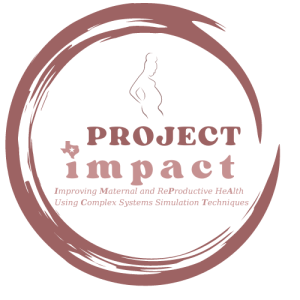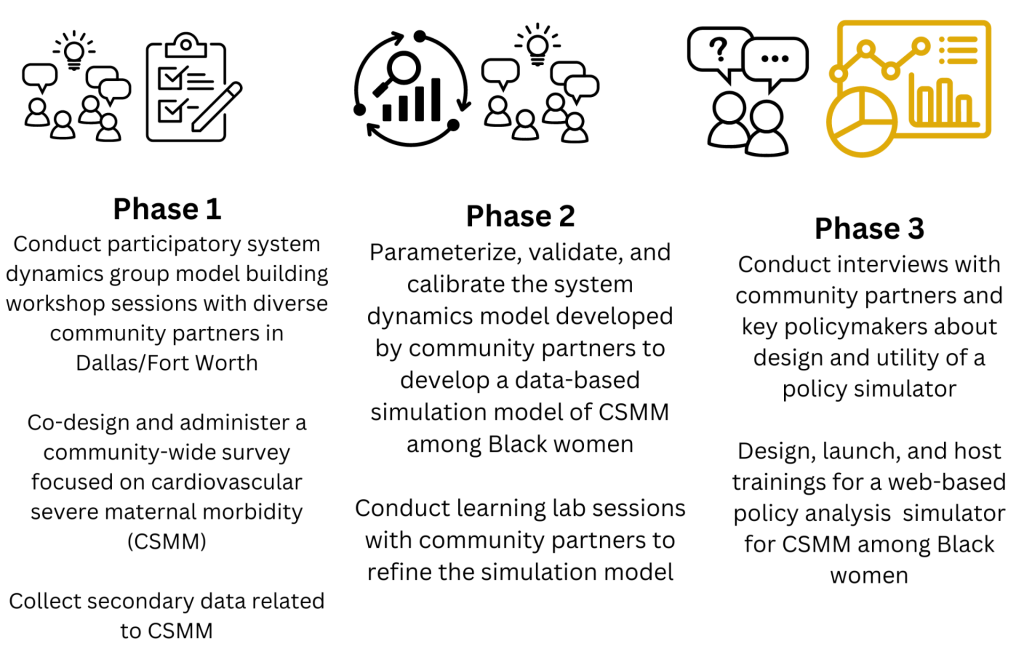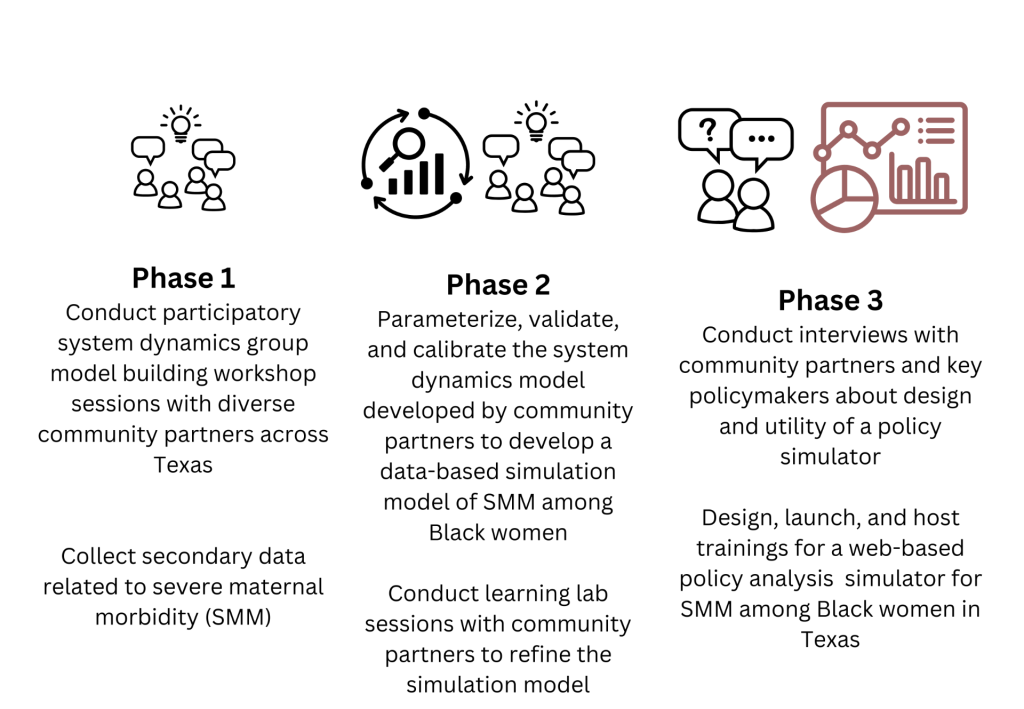
Project IMPACT (Improving Maternal and reProductive heAlth using Complex systems simulation Techniques) is a collaborative research enterprise dedicated to applying participatory systems approaches to inform community-driven solutions that can effectively respond to complex reproductive health issues. This work is guided by complex systems theories and perspectives, reproductive justice and research justice principles, and principles of Public Health Critical Race Praxis.
Our pilot work, funded by UTA Center for Research and Scholarship Pilot Grant Program (#313746), served as the foundation of the current projects and can be found here:
- Syndemic Perspectives to Guide Black Maternal Health Research and Prevention During the COVID-19 Pandemic.
- Planning, implementing, and evaluating an online group‐model‐building workshop during the COVID‐19 pandemic: celebrating successes and learning from shortcomings
- Complex systems and participatory approaches to address maternal health disparities: Findings from a system dynamics group model building project in North Texas
For more information, contact us at projectimpact@uta.edu.
MEET THE TEAM

Kyrah K. Brown, PhD. (Co-PI) is an assistant professor of public health at the University of Texas at Arlington. She is the director of the Maternal and Reproductive Health Equity Research Lab whose mission is to conduct high-quality, participatory, community-based research that investigates and addresses structural inequities (e.g., racism, colorism) that shape reproductive and cardiovascular health among Black women and other women of color across the lifecourse.
Michael K. Lemke, PhD. (Co-PI) is an assistant professor at the University of Houston-Downtown. As a community psychologist and population health scientist, he engages in population and safety research with a focus on chronic disease and acute injury prevention. He applies his expertise in complex systems perspectives and syndemic theoretical frameworks to preventable population health issues.
Saeideh Fallah-Fini, PhD. (Co-I) is an associate professor and associate chair of industrial and manufacturing engineering at California State Polytechnic University-Pomona. She is a system dynamics modeler by training and has extensive experience in development, calibration, and validation of system dynamics models of complex socio-technical systems with applications in public health. She has also worked on finding optimal policies in system dynamics models using machine learning algorithms such as reinforcement learning.
Tiffany B. Kindratt, PhD, MPH (Co-I) is an assistant professor of public health at the University of Texas at Arlington. She is the director of the Health Survey Research Lab whose mission is to conduct epidemiologic research studies focused on evaluating predisposing and enabling factors that influence individuals' health across the lifecourse using big data methodologies, training and mentoring future public health and medical studies, and implementing community-based participatory research and quality improvement methodologies in community and clinical settings.
Reverend Deneen Robinson, BSW (Community Investigator/Consultant) is the Executive Director of the Pregnancy Resource Center and one of the leading experts and advocates for reproductive justice and policy addressing the Black maternal and infant mortality crisis. Deneen is the current Pastor of local Dallas congregation: Church In The Cliff (CitC). Deneen leads this work with passion and earnest devotion to ensuring the lives of Black women are centered and prioritized. Until she dies, she will live out the mission to create a world that she wants to live in and work hard to leave her spot better than she found it. Rev. Deneen previously participated as a policy expert on the SD group model building pilot project in 2021.
Deneen’s mission is to create the world she wants to live in. In everything, she works to live out this mission. She began her service work at an early age. As her mother likes to say, she has always been helping someone. After a period of homelessness, Deneen would return to school and raise her two daughters in Austin, Texas while attending The University of Texas at Austin. Completing her last year of school, Deneen’s life took a different course. During her Social Work practicum, Deneen was hospitalized and diagnosed with HIV. At the time of her diagnosis, she said, “I want to plant seeds so my daughters will remember me.” Since then she has made her mark across our nation. For more than 30 years, Deneen has planted seeds. One of her most noted accomplishments is the women’s group, At the Kitchen Table which began in September of 1999. In March of 2000, she participated in the African American HIV University Fellowship in LA. The Fellowship gave her the additional skills necessary to educate, write and teach on the science of HIV and its concomitant health issues, community engagement, disease management and many other interpersonal and relationship skills. Her writings have been featured in Newsweek, HIV Plus, POZ, the Dallas Morning News, theBody.com, APHA and many other media outlets.
Thanayi Lambert, MSN, RNC-OB (Co-I)is a clinical assistant professor in undergraduate nursing at the University of Texas at Arlington. Her nursing practice is concentrated in women's and children's services and labor and delivery. In addition to teaching, she works as a Mother-Baby nurse and birth coach and is passionate about community building with a focus on empowering families, youth, and nurses and nurses-in-training.
Our renowned consultants include Dr. David Lounsbury (Albert Einstein College of Medicine) and Dr. Hazhir Rahmandad (MIT).
Maternal Health Research Center Objectives
This maternal health research center is a part of a 16 institution Maternal Health Research Collaborative for Minority Serving Institutions (MSIs) funded by U.S. Health Resources and Services Administration Maternal and Child Health Bureau.
Our overarching objectives include:
-
-
- Partner with community members and organizations to implement maternal health research
- Partner with community to disseminate research findings via presentations, publications, trainings, toolkits, etc. to support translation and implementation
- Submit at least one application for external funding outside of MCHB
- Develop strategies to build and maintain research capacity
- Mentor and train early-stage investigators and students from diverse backgrounds
- Develop relationships with other MCHB grantees and partners
- Participate in learning community; contribute to evaluations of the 16 research centers; and serve on steering committee for the Maternal Health Research Collaborative for MSIs
-
PROJECTS
Cardiovascular Severe Maternal Morbidity among Black Women in Dallas/Fort Worth Metroplex
Project Title: Using Participatory Complex Systems Approaches to Develop an Interactive Policy Analysis Simulator to Address Cardiovascular Severe Maternal Morbidity among Black Women
Project Overview

Phase 1
During this phase, we will be recruiting diverse stakeholders including persons with lived experience, birthworkers, midwives, nurses, physicians, historians, experts in housing and built environment, program administrators, researchers, and others. We will be hosting participatory system dynamics group model building workshop sessions focused on CSMM with these stakeholders to co-design a comprehensive explanatory model which will be the basis of the simulation tool.
Trainees
Updates in progress
Funding and Support
This five-year project is funded by the U.S. Health Resources and Services Administration Maternal and Child Health Bureau (UR6MC50344‐01‐00, 2023-2028) and is part of a 16-institution Maternal Health Research Collaborative for Minority Serving Institutions (MSIs), which is supported by the Morgan State University Maternal Health Equity Research Coordinating Center.
Dissemination
Please click/tap on the buttons below to see more content.
Severe Maternal Morbidity among Black Women in Texas
Project Title: Complex Systems Approaches to Advance Maternal Health Disparities Research and Prevention: Developing a System Dynamics Simulation Model of Severe Maternal Morbidity among Black Women.
Project Overview

Phase 1
During this phase, we will be recruiting diverse stakeholders including persons with lived experience, birthworkers, midwives, nurses, physicians, historians, experts in housing and built environment, program administrators, researchers, and others. We will be hosting participatory system dynamics group model building workshop sessions focused on SMM with these stakeholders to co-design a comprehensive explanatory model which will be the basis of the simulation tool.
Funding and Support
This five-year project is funded by the National Institute on Minority Health and Health Disparities (#R01MD017596, 2023-2028).

Dissemination
Please click/tap on the buttons below to see more content.
